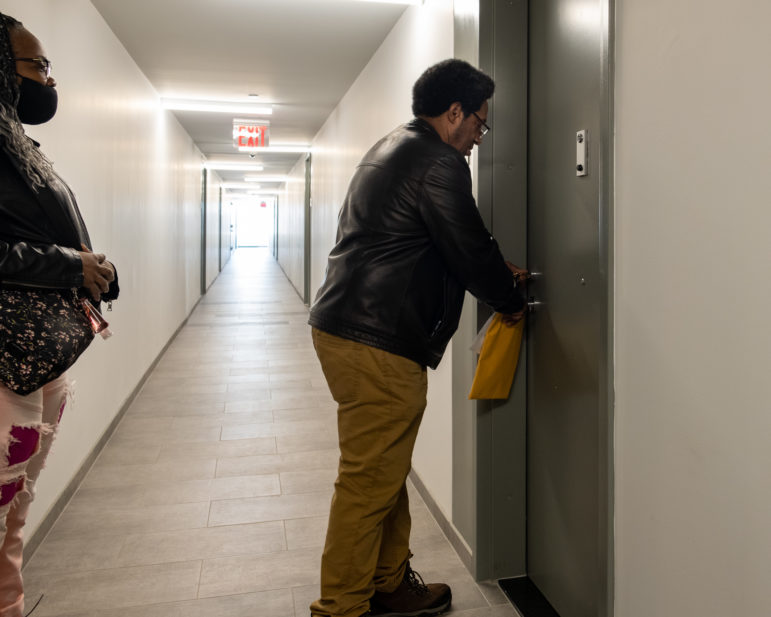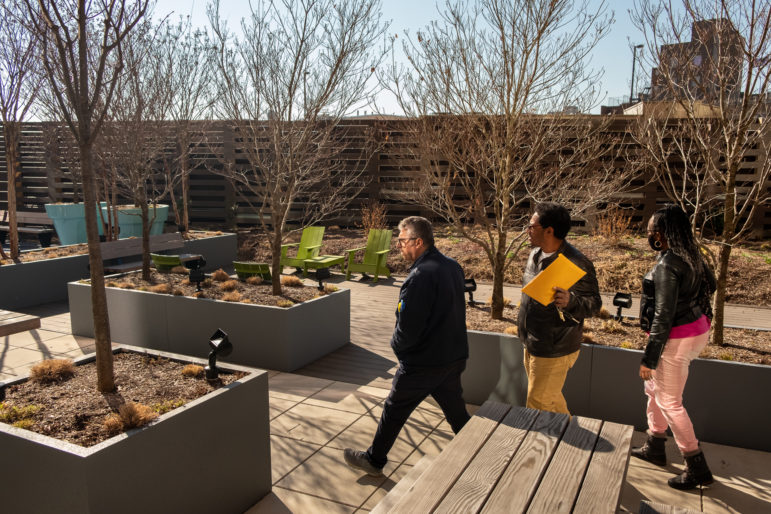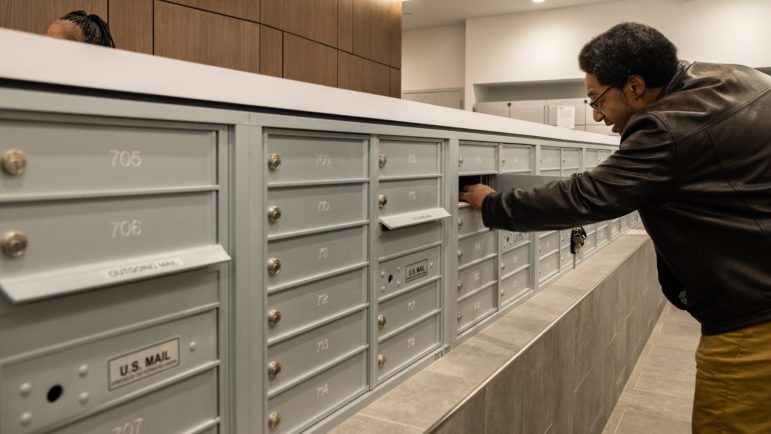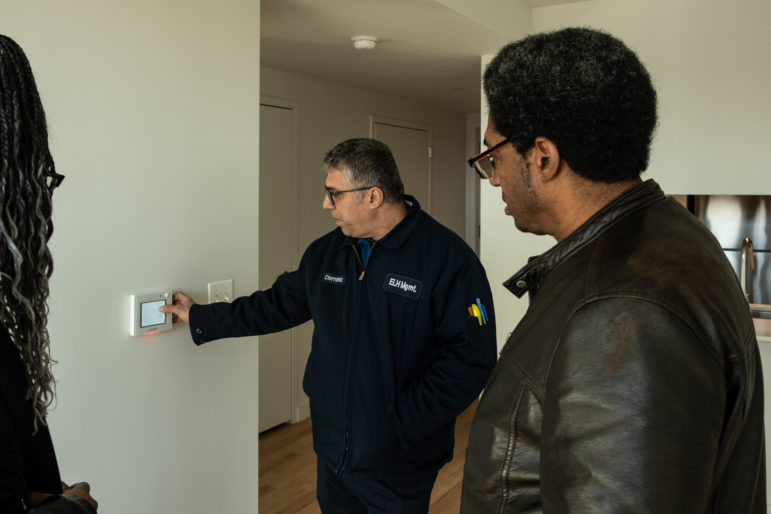A housing complex in Melrose has emerged as a new home for dozens of tenants displaced by January’s deadly Bronx fire. At least 45 households have so far signed leases at the building, and another 44 are expected to soon. Among the new residents: Mark Smith, who says he lost all his possessions in the Twin Parks blaze.

Adi Talwar
Mark Smith unlocking his apartment for the first time after signing a lease on March 14, 2022.Two months after losing everything in a fire that killed 17 of his neighbors, Mark Smith finally had reason to smile on a sunny Monday morning earlier this month.
Smith, keys in hand, had just signed a one-year lease on a seventh-floor apartment in La Central, a new housing complex near the bustling Hub commercial sector in Melrose. His unit has a dishwasher and a view of the 2 and 5 trains as they emerge above ground and turn onto elevated tracks along Westchester Avenue.
There’s also a functioning radiator and a built-in sprinkler system. The front door closes automatically. “I’m feeling alright now,” said Smith, as he walked the building hallways. “I’m getting a place.”
The lease signing marked a significant change in fortune for Smith, who had been living in what he called “slum” conditions at the Twin Parks North West high-rise—flooding, mold, vermin—before the Jan. 9 fire there forced him into a Webster Avenue hotel (The property owners say they never received a complaint from Smith about those problems).
Smith had spent the past five years on the third-floor of Twin Parks, a few doors down from where a space heater ignited, pumping smoke through a faulty door and into the rest of the 19-story tower. He said he probably would have succumbed to smoke inhalation inside his apartment if he were at home. “I probably would be dead,” he said. “Or I would have had to bust my windows and jump out.”
Instead, he ended up homeless without a single photograph, vital document or extra piece of clothing left. He said he had yet to receive a dime from a $4 million fund established in the wake of the tragic fire and did not seek a portion of the $1 million raised by the Gambian Youth Organization, a local nonprofit, though he did get some cash assistance from the Muslim Community Network and the Twin Parks ownership group. He also had support from Legal Aid’s Bronx Office. His attorney Maureen Stutzman, who assisted him in a previous housing court case, accompanied him to the lease signing March 14.
In the weeks since the fire, La Central has emerged as a hub for those displaced by the blaze. At least 45 households have so far signed leases at the 496-unit complex, according to the Mayor’s Office and a spokesperson for building owners Bronx Park Phase III Preservation, a trio of investment firms made up of Camber Property Group, LIHC Investment Group and Belveron Partners. Another 44 families and individuals are set to move in following negotiations between the Twin Parks landlords, city officials and the consortium of developers that own La Central, a group that includes The Hudson Companies, BRP Companies and the firm ELH-TKC. The five-building complex also includes a supportive housing residence run by the organization Breaking Ground that opened in 2019.
The city and the La Central landlords postponed an affordable housing lottery for the complex to allow Twin Parks tenants to move into the open units, building management said. The apartments, constructed with 421a tax abatements, have been sitting vacant since their completion in June 2021, reflecting the lengthy lease-up process for affordable units in the city’s Housing Connect lottery.
That was fine by Smith. Atop the 11th-floor roof deck, he pointed out the healthcare facility where his girlfriend works and looked out on the Manhattan skyline, partially obscured by a Yankees flag flapping on a building across the street.
“I’ll be sitting in a nice chair, watching the trains go by,” he said.
Smith is using a Section 8 voucher to cover the bulk of his $1,900-a-month rent and handed over a money order to the building’s assistant property manager, Millie Lieb, to cover his portion—30 percent of his Supplemental Security Income check.
The lease signing also had a special resonance for Lieb, who was twice displaced by fire while growing up around Soundview in the 1970s—like 56 children whose lives were disrupted in the Twin Parks blaze. “You grow up quick,” she said of a childhood scarred by flames.
She said she takes some time to herself after completing paperwork with each Twin Parks family and gives them room to grieve, or vent or celebrate however they prefer.
“I understand what it’s like,” Lieb added. “So I listen when they come in. I let them talk as much as they want.”
As Smith completed his package of paperwork, a woman who had already moved in entered the office to talk with Lieb’s colleague. Later in the day, Lieb was scheduled to meet with one more Twin Parks family for a lease signing.
Meanwhile, at least 40 families have returned to the Twin Parks building 30 blocks northeast on East 181st Street, city officials said. All but the 14 units on the third floor are back open to tenants, according to the ownership group. A spokesperson for the owners said they will credit tenants’ January, February and March rents.
Some 76 households remain in six hotels rented by the Department of Housing Preservation and Development (HPD), the Red Cross and the Twin Parks owners, a City Hall official said. They have until April 7 before they too must move out. By then, nearly three months will have passed since the fire.
Gambian Youth Organization founder Momodou Sawaneh, who distributed $5,000 to many of the Twin Parks households and $10,000 to the families of deceased victims, said that would be far too long to wait.
“By the end of the three months, they’re supposed to be placed somewhere, and if that doesn’t happen then we would say [city officials and the landlords] haven’t stepped up to the plate,” Sawaney said.
Reporting by the news site Documented has revealed how the city and landlords failed to go to bat for some of the tenants, sticking them in hotels infested with bed bugs while sitting on nearly $3 million in donated funds. The city had used about $1 million to distribute modest cash assistance to households while covering burial services and daily meals—though the food quality plummeted when a new provider took over, The City reported.
The news coverage seemed to spur the city into further action. Mayor Eric Adams pledged March 16 to distribute the full funding to the roughly 150 displaced families through the organization BronxWorks, which has been providing case management services.
“These families will soon see an additional $3 million begin to roll into their pockets to help them with food, housing, household items or anything else they lost,” Adams said.
It remains unclear how that will work for tenants like Smith, whose housing voucher is based on his income and for whom a one-time cash infusion could jeopardize a crucial rent subsidy. City Hall directed questions to BronxWorks, but BronxWorks said they needed specific permission from the city to respond to questions based on the terms of their contract.
The cash can’t come soon enough for Smith, however.
During a tour of one of his new building’s two laundry rooms, Smith remarked that he won’t be using the washing machines for a while. He has yet to rebuild the wardrobe he lost in the fire.
“I don’t have any clothes,” he said.












2 thoughts on “Two Months After Fatal Twin Parks Fire, a Fresh Start for One Tenant”
So, if I’m not mistaken the negligent slum lord owner of Twin Parks is again profiting by having tenants take newer apartments in another complex that they also own?
The best kept secret in NYC is HDFC buildings with 99yr leases however they are left to be managed by corrupt board members who do not follow policies and procedures, what a shame on the city. HDFC’S were formed to provide long-term permanent housing for the poorest of families, now gentrification is taking place and long-term families pushed out.